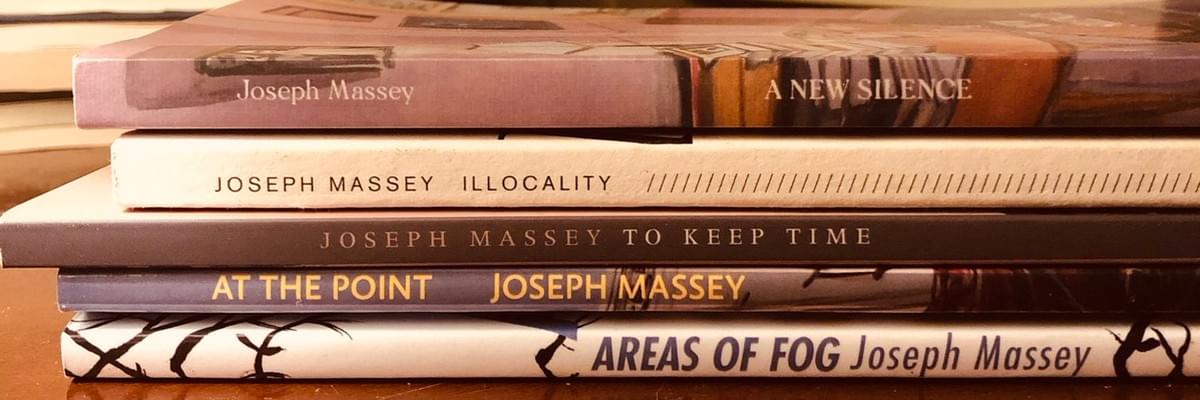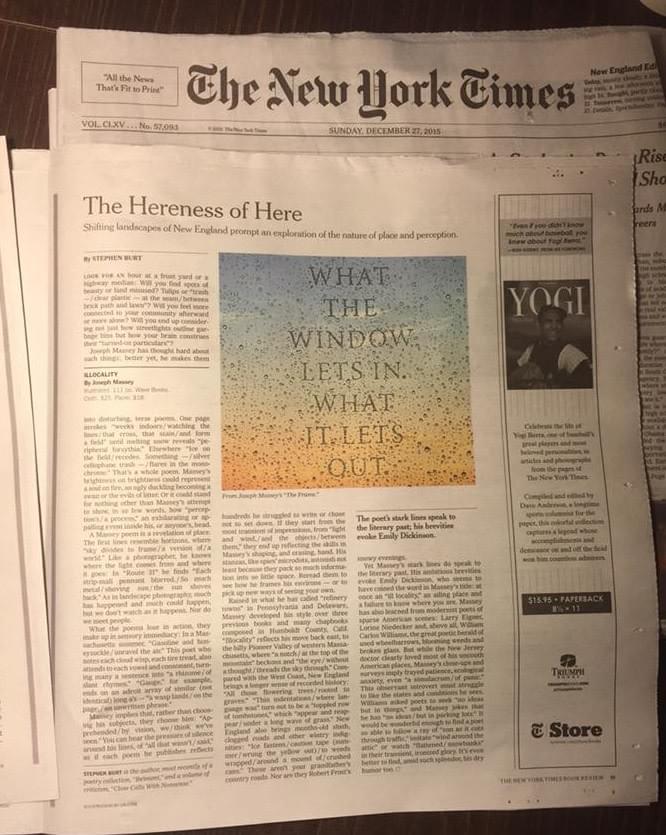

Joseph Massey
poet & writer
America Is the Poem
Available now! Click to purchase.

America Is the Poem takes the reader through a full year, from spring to winter, in poems rich with vivid imagery and a sense of the sacred in ordinary things. The title poem was written on the occasion of Donald Trump's second presidential inauguration and is an ode to "flyover country" and the forgotten working class, heralding a new beginning for America.
"Joseph Massey's poems do what poetry is called to do: they make us see with new eyes. Like the writers of classic haiku, Massey's currency is the detail of the world around him, and he employs both an enviable diction and acute observation in these poems. But his work also takes on enormous psychological and spiritual depth. Devoid of ego, concerned only with finding truth in neglected sights and spaces, this book is an antidote to the noise and confusion of the world, and the artifice of so much else that is written. A deeply rewarding, and ultimately moving, read."
—Sally Read, editor of 100 Great Catholic Poems"A Massey poem is a revelation of place."
The New York Times"I find it refreshing and somehow also sobering to observe the way Massey sticks so closely to the perceptual world. Like William Carlos Williams, he challenges us to see the value in putting things in words."
"Massey is among the most topographically responsive of modern American poets."
Times Literary SupplementJoseph Massey is the author of A New Silence (Shearsman Books, 2019), Illocality (Wave Books, 2015), and a trilogy grounded in the landscape of coastal Humboldt County, California: Areas of Fog (Shearsman Books, 2009), At the Point (Shearsman Books, 2011), and To Keep Time (Omnidawn, 2014).
His chapbooks include Minima St. (Range, 2003), Eureka Slough (Effing Press, 2005), Bramble (Hot Whiskey, 2005), Property Line (Fewer & Further, 2006), November Graph (Longhouse, 2007), Out of Light (Kitchen Press, 2008), Within Hours (Fault Line Press, 2008), The Lack Of (Nasturtium Press, 2009), Exit North (Book Thug, 2010), Mock Orange (Longhouse, 2010), Another Rehearsal for Morning (Longhouse, 2011), Thaw Compass (Press Board Press, 2014), An Interim (Tungsten Press, 2014), What Follows (Ornithopter Press, 2015), 5 Poems (Tungsten Press, 2018), Present Conditions (Hollyridge Press, 2018), and Backroad Scroll (Longhouse, 2019).His work has appeared in many journals and magazines, including The Nation, A Public Space, American Poet: The Journal of the Academy of American Poets, Verse, GeoHumanities, Talisman, and in anthologies: Visiting Dr. Williams: Poems Inspired by the Life and Work of William Carlos Williams (University of Iowa Press, 2011), Haiku in English: The First Hundred Years (W.W. Norton & Company, 2013), Please Excuse This Poem: 100 New Poems for the Next Generation (Viking Penguin, 2015), The Poem Is You: 60 Contemporary American Poems and How to Read Them (Belknap Press, 2016), and Renga for Obama (Harvard University Press, 2018).
His poems have been translated into French, Dutch, Bengali, Finnish, Czech, and Portuguese.
He lives in Upstate New York.Recent Interviews
- The Free Press - "Joseph Massey, the Unofficial Poet Laureate of Trump’s America" (April 2025)
- The Megyn Kelly Show - "Joseph Massey’s Patriotic New Book" (April 2025)
- Sasha Stone - "A Good Friday Special: Interview with Poet Joseph Massey" (April 2025)
- Pens & Poison Podcast - "Poetry & Things" (April 2025)
BOOKS & CHAPBOOKS

full-length books
Decades: Selected Poems (The Exile Press, 2024)
The Light of No Other Hour (The Exile Press, 2023)
Rosary Made of Air (The Exile Press, 2022)
A New Silence (Shearsman Books, 2019)
Illocality (Wave Books, 2015; Hollyridge Press, 2018)
To Keep Time (Omnidawn, 2014)
At the Point (Shearsman Books, 2011)
Areas of Fog (Shearsman Books, 2009)
chapbooks
Minima St. (Range, 2003)
Eureka Slough (Effing Press, 2005)
Bramble (Hot Whiskey, 2005)
Property Line (Fewer & Further, 2006)
November Graph (Longhouse, 2007)
Out of Light (Kitchen Press, 2008)
Within Hours (Fault Line Press, 2008)
The Lack Of (Nasturtium Press, 2009)
Exit North (Book Thug, 2010)
Mock Orange (Longhouse, 2010)
Another Rehearsal for Morning (Longhouse, 2011)
Thaw Compass (Press Board Press, 2014)
An Interim (Tungsten Press, 2014)
What Follows (Ornithopter Press, 2015)
5 Poems (Tungsten Press, 2018)
Present Conditions (Hollyridge Press, 2018)
Backroad Scroll (Longhouse, 2019)
Unsent (Wrack Line Editions, 2019)
No Omen (Otata's Bookshelf, 2019)
On the Cusp (Tungsten Press, 2021)
Breath Work: 60 Lunes (The Exile Press, 2022)
REVIEWS

Selected reviews of Illocality
"A Massey poem is a revelation of place."
—Stephen Burt, The New York Times
"Massey is among the most topographically responsive of modern American poets. In a book of, in the main, very short poems he offers a series of compelling meditations on being, dwelling, landscape, and form."
—David Wheatley, Times Literary Supplement
"Illocality is a rare specimen in contemporary poetry, where the din of loud, sometimes unnecessarily experimental work can drown out such a quiet and contained voice. These poems are subtle, but sharp. Their formal precision—so nimble on the page—gives way to a rigorous thematic investigation into the nature of intellect itself."
—John James, Colorado Review
“'No ideas/ but in parking lots,'” writes Massey in his fourth collection as he picks up where 2014’s To Keep Time leaves off, this time invoking the specter of William Carlos Williams. He pays close attention to his immediate surroundings, in poems built with a keen ear and in sparse lines that appear luminous on the open space of the page."
—Publishers Weekly
"If you aren’t reading Joseph Massey, you should be. Itself a fresh start, this new book is a good place to begin. Most poets’ body of work presents a worldview. His is a world."
—Rob Stanton, Entropy Magazine
"Nature, reinvented. An abundance of sound. Nimbly drawn images. The poetry of the environment. Massey gives us all of this, as he allows his poems to enter the world nearly naked, wearing only the moment itself."
—Ann van Buren, The Rumpus
"Illocality offers expertly executed poems that stitch scene to thought in a way that gives body to the voice of the poet, that imbues the occasions and locations of the poems with a very physical sense of consciousness, one working, line-by-line, to understand, to be a part of the world. These are austere poems in their feel, but they are rich in maneuvers, and their meditations leave the reader in a deeply satisfied, mindfully mindless, state."
—Ryo Yamaguchi, NewPages
"[Massey’s] minimalism allows words themselves to come forward in new ways, like workhorses happily unhitched from their harnesses, no longer obliged to convey human meaning from one place to another."
—Justin Quinn, The Poetry Society
"Minimalist in nature, there is not much of the personal voice in these poems. Mostly, there is seeing. With little presence of an “I” that calls attention to itself, the words themselves seem to take on the dress of animation. Sometimes the words click. Sometimes they snake or fold. Sometimes they pause to breathe. Massey writes, It must be enough/ to live in the variations/ of wind alone./ To sing the seams. In reading these poems, I can begin to believe it."
—Elisabeth Whitehead, Tarpaulin Sky
"One of Massey’s achievements is his ability to use the language of language, the language of poetry itself to refer, or at least gesture to, the world — for example, “watching the lines / that cross, that stain and form a field” or “In the indent of / a day / wagging / ferns […]” — so that his poetry foregrounds a capacity to perform a self-reflexive examination. That is, it refers to the real world, but it is also self-conscious about the way in which the poem is making that real world in poetry."
—Jon Thompson, Free Verse
Selected reviews of To Keep Time"Massey sketches the visible (clouds in the sky, power lines that 'suspend a crow—/ sliver of cellophane/ cinched in its beak') and obsessively documents sound in a manner only the most acutely perceptive listeners could match. 'As long as blood runs/ the body,/ there is no silence,' he observes with a hint of foreboding. At certain points, he departs from his observations of the aural and the visible, struggling to reach for some insight into the stillness before it 're-/ coils into noise' and is drowned out in the loud racket of the mind. These moments of vulnerability blur the lines between Massey’s inner anxiety and the calm of the immediate environment, providing an element of fragility and sophistication to his small, glinting pieces."
—Publishers Weekly (Starred Review)
"Massey puts into practice a great solution: his poems about cloud and seacoast, storefront and windowsill, ask you to look for ironies, overtones, and phenomenological claims in their own sounds, and to do so with the same care that the poems afford in their aggressively minimal scenes. Each word rewards sustained, minute attention."
—Stephen Burt, The Believer
"In distilled, acutely observed poems, Massey builds the world out of light and shadow; he helps us see pattern and grid, the thinning sunlight, 'slow/ flowering/ of form flowering/ out of form.' Remarkably, and important to his poetry, he also helps us hear sound and even its absence: 'As long as blood runs/ the body,/ there is no silence.// Silence hums.' Here, exterior and interior are continuous; the physical world touches us as 'Inward/ a world// accumulates.' You can’t call this nature poetry, but it’s a beautiful rendition of what’s breathable."
—Barbara Hoffert, Library Journal
"Joseph Massey’s collection of fierce minimalistic observations contain a cascading effect, where the velocity of the word-sounds build anticipation yet stall with a density of ideas."
—Evan Karp, SF Weekly
"Massey’s work is often characterized by its stillness, its steady placidity. But these are not poems of quietism. The pieces in To Keep Time are full of organic density, vibrating with some unknowable animation. As muffled and muted as they sometimes seem in all their meditative glory, these poems still speak affirmatively of the tactile pleasure of the world in nature, in the senses, and in language—and then there’s more."
—Housten Donham, The Volta Blog
"To Keep Time appears to revel in non-specificity, with Massey going so far as to gloss a particular bit of flora as only “some sprawling pastel plant / I still don’t know the name of.” Even those animals and plants that are specifically identified aren’t peculiar to place. Hummingbirds can be found throughout North America; oaks and ravens would be as much at home in a Japanese or an Irish poem as an American one. But these obliquely fitful poems are, as the book’s title implies, not about place, but time—waiting through it, weighting it, as the speaker keeps watch over his internal seasons. Detailed geographies would be beside the point."
—Maureen Thorson, Open Letters Monthly
"Massey is a latter-day Anchorite, abstracted salutarily from our distractions. He mocks himself for this—it’s not enough to live in a world like the one his book describes—but a soujourn there healthily alerts us to the other world we live in, one we mostly overlook but will always be there waiting for us."
—Justin Quinn, Body Literature
"These are poems wrenched with the desire to represent the strange commingling of voice and silence, sight and texture, meaning and meaninglessness. They are poems poised excruciatingly between 'not enough' and 'too much'—poems that proceed, therefore, with an artful fear or distrust of the lyric impulse, as if in singing too much they would misrepresent the shadowy brooding mood out of which the poems take flight."
—Andrew Field, Jerry Magazine
All donations support my work as an independent poet, writer, and artist.
Thank you for your support!
Feel free
to write to me.
Follow me on X: @jmasseypoet
Copyright 2018


